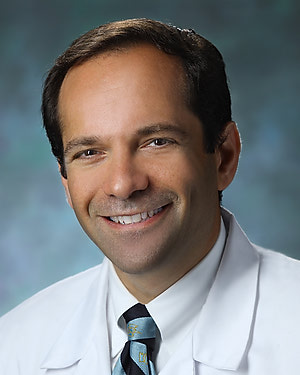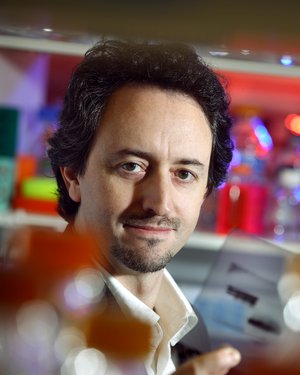Research Lab Results
-
Adamo Cardiac Immunology Lab
Over the last few decades, a growing body of evidence has shown that the immune system is intimately connected with cardiac development, function and adaptation to injury. However, there is still much to learn and currently there are no immunomodulatory treatments to prevent or treat heart dysfunction. The Adamo Lab aims to study applied immunology in the context of cardiac function and dysfunction, to both elucidate fundamental properties of the immune systems and to develop novel therapeutic options for the rapidly growing number of patients living with heart disease. -
Johns Hopkins University Dermatology, Allergy and Clinical Immunology (DACI) Reference Laboratory
The mission of the Johns Hopkins University Dermatology, Allergy and Clinical Immunology (DACI) Reference Laboratory is to provide comprehensive, high-quality diagnostic allergy and immunology testing to patients throughout North America with asthma, allergy and immunologic disorders. We offer an extensive menu of laboratory tests that includes allergen-specific IgE measurements to approximately 300 pollen, epidermal, mold spore, mite, food, drug, venom and occupational allergen specificities. We specialize in Hymenoptera (insect sting) venom-specific IgE and IgG antibody measurements. In addition, the DACI Laboratory performs hypersensitivity pneumonitis precipitin panels, serum cotinine, and environmental mold measurements. -
The Laboratory for Precision Immunology
We are devoted to developing and deploying cutting edge technologies that can be used to define human immune responses. Much of our work leverages ‘next generation’ DNA sequencing, which enables massively parallel molecular measurements. Examples of our technologies include: - bacteriophage display of synthetic peptidome libraries for comprehensive, quantitative profiling of antibodies; - display of ORFeome libraries for antigen discovery, protein-protein interaction studies, and drug target identification; - ultrasensitive, multiplex RNA quantification techniques to monitor gene expression and detect microbes; - pooled genetic screening to elucidate immune cell function and identify new therapeutic targets. The Larman Laboratory uses these and other approaches to identify opportunities for monitoring and manipulating immune responses. -
Arturo Casadevall Lab
The Arturo Casadevall Lab uses a multidisciplinary approach to explore two key topics within microbiology and immunology: how microbes cause disease and how hosts can protect themselves against those microbes. Much of our research focuses on the fungus Cryptococcus neoformans, which frequently causes lung infections in people with impaired immunity. We also work with the microorganism Bacillus anthracis, a bacterium that causes anthrax and is frequently used in biological warfare. Our goal is to devise antibody-based countermeasures to protect against this and other similar threats.
-
Andrew Lane Lab
The Lane laboratory is focused on understanding molecular mechanisms underlying chronic rhinosinusitis, particularly the pathogenesis of nasal polyps, as well as inflammation on the olfactory epithelium. Diverse techniques in molecular biology, immunology, and physiology are utilized to study epithelial cell innate immunity, olfactory loss, and response to viral infection. Ongoing work explores how epithelial cells of the sinuses and olfactory mucosa participate in the immune response and contribute to chronic inflammation. The lab creates and employs transgenic mouse models of chronic nasal/sinus inflammation to support research in this area. Collaborations are in place with the School of Public Health to explore mechanisms of anti-viral immunity in influenza and COVID-19.
-
Andrew Laboratory: Center for Cell Dynamics
Researchers in the Center for Cell Dynamics study spatially and temporally regulated molecular events in living cells, tissues and organisms. The team develops and applies innovative biosensors and imaging techniques to monitor dozens of critical signaling pathways in real time. The new tools help them investigate the fundamental cellular behaviors that underlie embryonic development, wound healing, cancer progression, and functions of the immune and nervous systems. -
Andrea Cox Lab
Research in the Andrea Cox Lab explores the immune response in chronic viral infections, with a focus on HIV and the hepatitis C virus (HCV). In our studies, we examine the role of the immune response upon exposure to HCV by examining responses to HCV in a longitudinal, prospective group of high-risk individuals. This enables us to compare the innate, humoral and cellular immune responses to infection with clearance versus persistence. Through our findings, we seek to identify mechanisms of protective immunity against HCV infection and improve HCV vaccine design.
-
Antoine Azar Lab
The Antoine Azar Lab conducts research on topics related to primary immunodeficiency diseases, allergies and lung disease. Specifically, we explore the role of primary immunodeficiency in certain difficult-to-treat chronic lung diseases, such as COPD, emphysema and asthma.
-
Joel Pomerantz Laboratory
The Pomerantz Laboratory studies the molecular machinery used by cells to interpret extracellular signals and transduce them to the nucleus to affect changes in gene expression. The accurate response to extracellular signals results in a cell's decision to proliferate, differentiate or die, and it's critical for normal development and physiology. The dysregulation of this machinery underlies the unwarranted expansion or destruction of cell numbers that occurs in human diseases like cancer, autoimmunity, hyperinflammatory states and neurodegenerative disease. Current studies in the lab focus on signaling pathways that are important in innate immunity, adaptive immunity and cancer, with particular focus on pathways that regulate the activity of the pleiotropic transcription factor NF-kB.
-
Joseph Margolick Lab
Research in the Joseph Margolick Lab focuses on the many effects of HIV/AIDS on human health. We are particularly interested in the mechanisms of T-cell loss and preservation among people infected with HIV and the evaluation of human immune functions.




